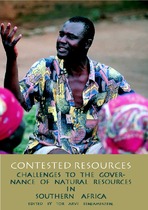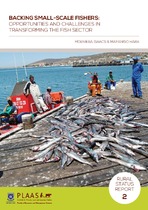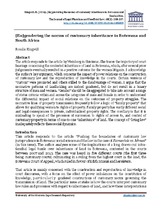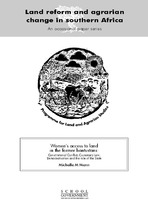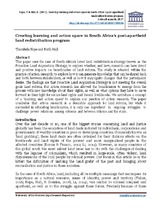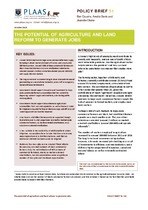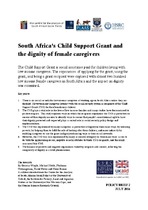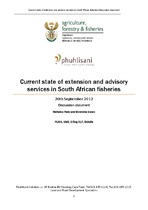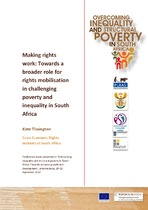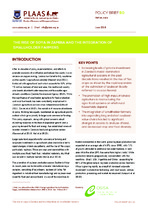Search
Now showing items 1-10 of 1087
Contested resources: Challenges to the governance of natural resources in Southern Africa
(Institute for Poverty, Land and Agrarian Studies, University of the Western Cape, 2002)
In this keynote address I wish to identify some
important ideas and conclusions arising out of recent
analyses of theory and practice on natural resource
management. I use these in a preliminary attempt to
argue that ...
Backing small-scale fishers: Opportunities and challenges in transforming the fish sector
(Institute for Poverty Land and Agrarian Studies (PLAAS), 2015)
Globally, small-scale fisheries play a significant role in food security, poverty reduction and income generation (Béné et al 2007; Heck et al 2007; Béné et al 2010; FAO 2003). At the 2008 Global Conference on Small-Scale ...
[En]gendering the norms of customary inheritance in Botswana and South Africa
(Taylor & Francis, 2016)
The article responds to the article by Weinberg in this issue. She traces the trajectory of court hearings concerning the contested inheritance of land in Botswana, which, after several prior judgements eventually resulted ...
Women's access to land in the former bantustans: Constitutional conflict, customary law, democratisation and the role of the state
(Institute for Poverty Land and Agrarian Studies (PLAAS), 2000)
The transition to local democratic institutions in the former bantustans of South Africa will not in itself fulfil the constitutional imperative for the promotion of gender equality, specifically in relation to womenís ...
Creating learning and action space in South Africa’s post-apartheid land redistribution program
(SAGE Publications, 2017)
This paper uses the case of South Africa’s latest land redistribution strategy known as the Proactive Land Acquisition Strategy, to explore whether, and how, research can have direct and positive impacts on beneficiaries ...
The potential of agriculture and land reform to generate jobs
(Institute for Poverty, Land and Agrarian Studies, University of the Western Cape, 2018)
Extremely high levels of unemployment contribute to poverty and inequality, and are one of South Africa’s most intractable problems. Can the agricultural sector help to address the problem? And how can land reform be ...
South Africa’s Child Support Grant and the dignity of female caregivers
(Institute for Poverty, Land and Agrarian Studies, University of the Western Cape, 2014)
The Child Support Grant (CSG) is social assistance for children with low income caregivers. It is
currently paid at the rate of R310 per month and there are more than 11 million child
beneficiaries. Almost all (98%) of ...
Current state of extension and advisory services in South African fisheries
(Institute for Poverty Land and Agrarian Studies (PLAAS), 2012)
The fishing industry can be divided into marine, recreational, aquaculture and inland sub-sectors. The marine sub-sector is the main commercial fishing sector comprised of industrial fishing and also small-scale fishing, ...
Making rights work: Towards broader role for rights mobilisation in challenging poverty and inequality in South Afric
(Institute for Poverty Land and Agrarian Studies (PLAAS), 2010)
This paper contemplates a broader conceptualisation/role for socio-economic rights use and mobilisation in South Africa, which not only mitigates the effects of poverty and inequality but also undertakes to address the ...
The rise of Soya in Zambia and the integration of smallholder farmers
(Institute for Poverty, Land and Agrarian Studies, University of the Western Cape, 2018)
After six decades of policy experimentation, and efforts to promote economic diversification and reduce the country’s over-reliance on copper mining, Zambia has failed to fully capitalise on the country’s agricultural ...

